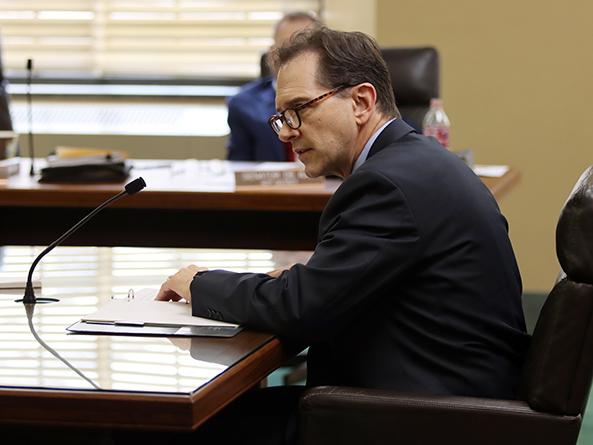Expansion of self-defense laws proposed
A bill meant to strengthen an individual’s right to use deadly force to defend themselves or others was considered Feb. 8 by the Judiciary Committee.
Currently, the state’s “castle doctrine” permits an individual to use deadly force to defend themselves or others against an assailant in their home or workplace, if there is a reasonable and good faith reason to believe that there is an immediate threat of death or serious bodily injury.

LB1269, introduced by Sen. Brian Hardin of Gering, would expand the law to include personal vehicles and public places. It also would provide criminal and civil protections for individuals who use force in self-defense. Similar laws in other states commonly are referred to as “stand your ground” laws.
The proposal would repeal the existing “duty to retreat” — or flee a situation if safe to do so — before using force. Hardin said the duty to retreat forces a person to make a split-second decision in a dangerous situation, which he said creates an “unrealistic expectation.”
“The main goal of LB1269 is to provide an avenue to ensure that an individual who is already a victim of a crime, and had to use deadly force in self-defense, is not also victimized by the legal system,” Hardin said.
Patricia Harrold, speaking on behalf of Women for Gun Rights, testified in support of the proposal. LB1269 isn’t a gun bill, she said, but rather a self-defense bill that permits people to use deadly force only when there is an immediate threat.
“Whether armed or unarmed, the idea that citizens are required to endanger themselves by turning their backs and running away from a clear and present danger is nonsensical,” Harrold said.
Also testifying in support of the bill was Jon Anderson of Norfolk, who serves as a member of the Nebraska Firearms Owners Association board of directors. Repealing the duty to retreat would alleviate pressure for someone to stop and consider if they can safely escape before using force, he said, which could be the difference between life and death in a time-sensitive situation.
“If deadly force is justifiable, then escape is not even an option,” Anderson said. “And if escape is an option, deadly force is not justifiable.”
Douglas County Attorney Don Kleine testified against LB1269 on behalf of the Nebraska County Attorneys Association. Kleine warned of the potential unintended consequences, such as people using the law as a defense in inapplicable situations, such as gang activity.
Additionally, he said, Nebraska’s “castle doctrine” already provides legal protection for people who use force to defend themselves at home or at work.
“I think that the current law as it exists protects people and allows them to use deadly force when it’s necessary,” Kleine said.
Also testifying in opposition to the bill was Mark Richardson, who spoke on behalf of the Nebraska Association of Criminal Defense Attorneys. He expressed concern that a “stand your ground” law would provide “broad and sweeping” immunity, making it more difficult for the courts to hold people who misuse it accountable.
“Imposing liability [or] immunity like this takes away the ability of Nebraska citizens to have their complaints heard by other Nebraska citizens and render the proper verdicts,” Richardson said.
Testifying in opposition on behalf of Everytown for Gun Safety, Alison Shih said “stand your ground” laws have not proven effective in crime prevention, but instead have led to increased crime in states where the laws are in effect.
“While homicides have increased in states that have adopted these laws, the number of homicides in states with traditional self-defense laws has remained steady or decreased,” she said.
The committee took no immediate action on LB1269.


